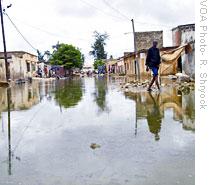Dakar
31 August 2009
After heavy rains led to widespread flooding in the capital, Dakar, Senegal's Prime Minister has activated a national disaster-response plan to relieve thousands of people affected by the floodwaters. Dakar's sprawling suburbs have been hit the hardest.
 |
| Flood waters inundate a neighborhood on the outskirts of Dakar after heavy rains, 31 Aug 2009 |
The International Federation of the Red Cross and Red Crescent Societies has also provided 194 families with emergency supplies including mosquito nets, tarpaulins and water purification tablets.
Despite these efforts, Dakar's densely-populated suburbs are still suffering the effects of the rain as inhabitants live suspended above floodwaters that have nowhere to go.
Ndiaye Thiaw lives in Wahkinane Nimzatt, a neighborhood that has been hit hard by the recurrent floods. She lives on the edge of a large basin dug by the government in 2005 to contain floodwaters.
This year, the basin burst its banks and Thiaw's house now sits on a lone promontory surrounded by trash-filled water.
Thiaw says the water has a huge effect on her family. The conditions we live in are really appalling, she says. Every evening we sit here and break the [Ramadan] fast here in the water. If we had the means, she says, we would do something to stop the water from coming in.
In Thiaw's bedroom, her wooden bedframe sits on bricks, suspended above a foot of yellowish water. In the courtyard, food and cooking utensils are balanced on stacked stones.
Thiaw is worried about the health effects of the water invading her house.
Thiaw says she lights mosquitoes coils to keep the mosquitoes away. We have suspended everything above water level, she says, including important papers like birth certificates and clothes. We make sure our plates do not touch the water and before eating we wash our hands with bleach because this water is full of germs.
Alioune Badara Faye is the newly-elected mayor of Wakhinane Nimzatt. He is troubled by the lack of preparation for an event that is predictable.
Faye says the government waits until the disaster strikes before they activate their emergency plan. They have just released $4 million for flood relief, he says. But what if they had put that money into preparing? The $4 million is difficult to track, it disappears with petrol and food costs. In the end we do not see the impact of that money here.
Though the emergency plan is helping some, Faye says, it is not enough.
The government has provided motorized pumps to evacuate water from flooded areas. At a press conference last week, Senegal's prime minister Souleymane Ndéné Ndiaye said that without these efforts the flooding could have been a lot worse.
As the rainy season continues, weather forecasts promise more rain and surely more flooding.